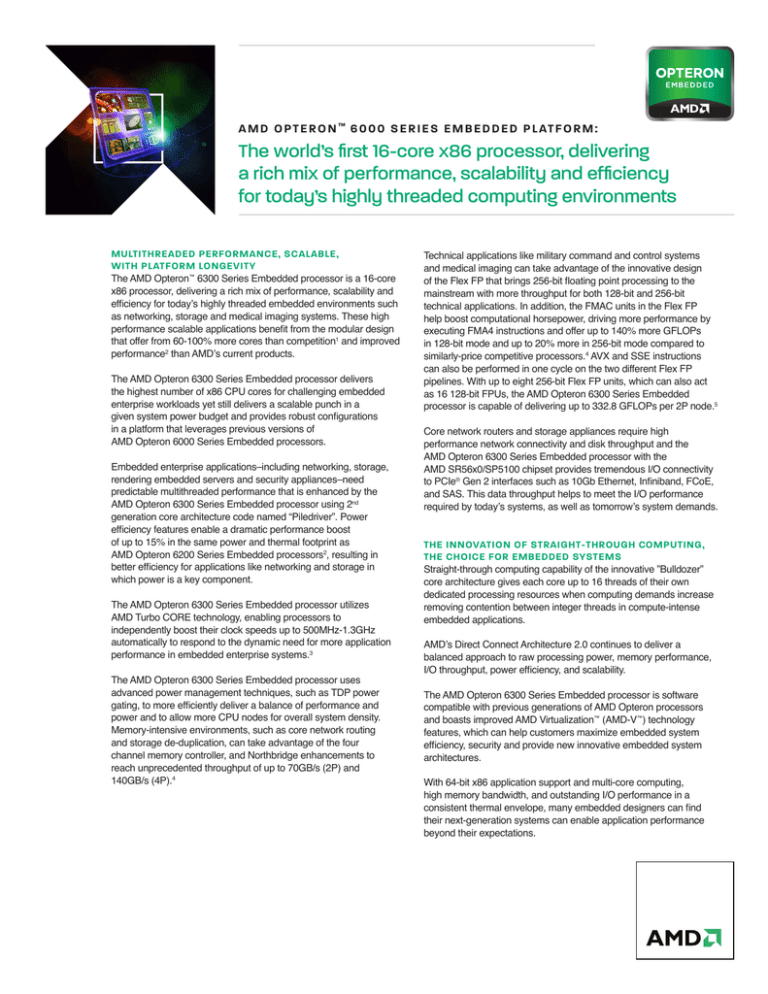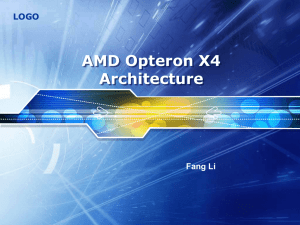
AM D OPTERON ™ 6000 SE RIE S E MBE DDE D PLATFO RM:
The world’s first 16-core x86 processor, delivering
a rich mix of performance, scalability and efficiency
for today’s highly threaded computing environments
MULTITHREADED PERFORMANCE, SCALABLE,
WITH PLATFORM LONGEVITY
The AMD Opteron™ 6300 Series Embedded processor is a 16-core
x86 processor, delivering a rich mix of performance, scalability and
efficiency for today’s highly threaded embedded environments such
as networking, storage and medical imaging systems. These high
performance scalable applications benefit from the modular design
that offer from 60-100% more cores than competition1 and improved
performance2 than AMD’s current products.
The AMD Opteron 6300 Series Embedded processor delivers
the highest number of x86 CPU cores for challenging embedded
enterprise workloads yet still delivers a scalable punch in a
given system power budget and provides robust configurations
in a platform that leverages previous versions of
AMD Opteron 6000 Series Embedded processors.
Embedded enterprise applications–including networking, storage,
rendering embedded servers and security appliances–need
predictable multithreaded performance that is enhanced by the
AMD Opteron 6300 Series Embedded processor using 2nd
generation core architecture code named “Piledriver”. Power
efficiency features enable a dramatic performance boost
of up to 15% in the same power and thermal footprint as
AMD Opteron 6200 Series Embedded processors2, resulting in
better efficiency for applications like networking and storage in
which power is a key component.
The AMD Opteron 6300 Series Embedded processor utilizes
AMD Turbo CORE technology, enabling processors to
independently boost their clock speeds up to 500MHz-1.3GHz
automatically to respond to the dynamic need for more application
performance in embedded enterprise systems.3
The AMD Opteron 6300 Series Embedded processor uses
advanced power management techniques, such as TDP power
gating, to more efficiently deliver a balance of performance and
power and to allow more CPU nodes for overall system density.
Memory-intensive environments, such as core network routing
and storage de-duplication, can take advantage of the four
channel memory controller, and Northbridge enhancements to
reach unprecedented throughput of up to 70GB/s (2P) and
140GB/s (4P).4
Technical applications like military command and control systems
and medical imaging can take advantage of the innovative design
of the Flex FP that brings 256-bit floating point processing to the
mainstream with more throughput for both 128-bit and 256-bit
technical applications. In addition, the FMAC units in the Flex FP
help boost computational horsepower, driving more performance by
executing FMA4 instructions and offer up to 140% more GFLOPs
in 128-bit mode and up to 20% more in 256-bit mode compared to
similarly-price competitive processors.4 AVX and SSE instructions
can also be performed in one cycle on the two different Flex FP
pipelines. With up to eight 256-bit Flex FP units, which can also act
as 16 128-bit FPUs, the AMD Opteron 6300 Series Embedded
processor is capable of delivering up to 332.8 GFLOPs per 2P node.5
Core network routers and storage appliances require high
performance network connectivity and disk throughput and the
AMD Opteron 6300 Series Embedded processor with the
AMD SR56x0/SP5100 chipset provides tremendous I/O connectivity
to PCIe® Gen 2 interfaces such as 10Gb Ethernet, Infiniband, FCoE,
and SAS. This data throughput helps to meet the I/O performance
required by today’s systems, as well as tomorrow’s system demands.
THE INNOVATION OF STRAIGHT-THROUGH COMPUTING,
THE CHOICE FOR EMBEDDED SYSTEMS
Straight-through computing capability of the innovative ”Bulldozer”
core architecture gives each core up to 16 threads of their own
dedicated processing resources when computing demands increase
removing contention between integer threads in compute-intense
embedded applications.
AMD’s Direct Connect Architecture 2.0 continues to deliver a
balanced approach to raw processing power, memory performance,
I/O throughput, power efficiency, and scalability.
The AMD Opteron 6300 Series Embedded processor is software
compatible with previous generations of AMD Opteron processors
and boasts improved AMD Virtualization™ (AMD-V™) technology
features, which can help customers maximize embedded system
efficiency, security and provide new innovative embedded system
architectures.
With 64-bit x86 application support and multi-core computing,
high memory bandwidth, and outstanding I/O performance in a
consistent thermal envelope, many embedded designers can find
their next-generation systems can enable application performance
beyond their expectations.
AMD OPTERON ™ 6300 SERIES EMBEDDED PROCESSORS
OFFER THE FOLLOWING UNIQUE ADVANTAGES FOR
EMBEDDED ENTERPRISE SYSTEMS:
Outstanding performance scalability
Leadership x86-64 16-core processor with quad memory channel.
Innovative “Piledriver” core architecture
Provides the right balance of price performance per watt by sharing
resources–such as fetch and decode logic–to help reduce power
and die size, and increase execution units for improved performance.
This redesigned architecture optimizes execution paths that help
reduce the total power consumption by actually optimizing the way
software runs.
New power management and power saving capabilities
New power management capabilities allow for larger parts of the
processor to be almost completely powered off when not being
used, dramatically reducing idle core power consumption and
enabling active cores to run at a higher frequency.
New power saving features like TDP-based power capping put
the customer in control of more aspects of power efficiency than ever
before on AMD Opteron processor-based embedded platforms.
Consistent platform with Socket C32 and the AMD SR56x0/
SP5100 chipset offers a platform compatibility with existing
AMD Opteron 6200 Series Embedded processor-based systems.
Reliable, scalable
Reliability is key in selecting embedded system components.
The AMD Opteron 6300 Series Embedded processor provides
scalability options with glueless multi-processing from one to four
socket systems. This, combined with the reliability of AMD64
technology, helps enable an embedded design that can provide
customers a long range plan for the life cycle of their systems.
Sage EDK provides a complete Integrated Development
Environment (IDE) for debug and software development.
BEYOND OUTSTANDING PROCESSORS: EXCEPTIONAL
DESIGN SUPPORT, QUICK TIME TO MARKET
AMD understands the unique requirements of the embedded market
and our AMD Embedded Solutions are in place to help maximize the
available choice of leading edge x86 processors–delivering a wide
range of performance, power, thermal, and packaging features.
AMD has a strong design support program in place. From reference
designs to extensive and readily available documentation to a suite
of leading debug tools, our goal is to make your design cycle quick
and efficient and to help you get your embedded products on the
market quickly.
AMD Opteron™ 6300 Series Processors: Socket G34
Model1
63766
6366 HE6
OPN2,3
OS6376WKTGGHKS
OS6366VATGGHKS
Core Freq.
(Nominal/
Boost)4
Cache
Max
TDP
Memory
Interface5
HyperTransport™
Interface
Socket/
Package
2.3/3.3GHz
L2: 8x2MB (2MB per core
pair = 16 cores) L3: 16MB
115W
85W
Four 16-lane @ up to
6400MT/s, Full Duplex
G34
1.8/3.1GHz
L2: 8x2MB (2MB per core
pair = 16 cores) L3: 16MB
DDR3-1600, 4-ch,
Registered ECC
DIMM & Chipkill
1. Processors include the following features: C1E, AMD Cool Speed, Precision Thermal Monitor, Remote Power Management Interface, DDPM, AMD CoolCore™ technology, Enhanced AMD PowerNow!™
technology, AMD Wide Floating Point Accelerator, AMD Memory Optimizer Technology, AMD Balanced Smart Cache, AMD Virtualization™ (AMD-V™), EVP, and OPMA support. Always refer to the processor
data sheets for technical specifications. Feature information is provided for reference only.
2. Product longevity is defined by Ordering Part Number (OPN) rather than model number.
3. OPN remains consistent throughout the longevity period (5 years + 2 years possible EOL contract).
4. AMD Turbo CORE technology allows processors to independently boost their clock speeds, scaling frequency up 500MHz-1GHz automatically to respond to the need for more application performance.
5. Supports registered Ultra LV-DDR3 (1.25V) and LV-DDR3 (1.35V).
6. Standard. Server SKUs. Please contact your AMD sales representative to discuss longevity extensions.
WHAT CAN THIS BALANCED ARCHITECTURE DELIVER?
• High compute performance with up to 16 cores using straight-through computing
• Scalability up to 4 sockets or 64 cores
• AMD Turbo CORE technology for increased performance by utilizing additional power headroom
• Memory bandwidth with 4-channel DDR3 memory controller
• Tremendous I/O bandwidth with three HyperTransport™ 3.0 technology links between processors and I/O
• Software compatible with existing AMD processors
• Platform compatibility with today’s AMD Opteron 6200 Series Embedded processor-based solutions
1. AMD Opteron™ 6300 Series processors have up to 16 cores. Intel Xeon E5-2600 Series processors have up to 8 cores per processor. Intel Xeon E7-4800 Series has up to 10 cores
per processor. See www.intc.com/pricelist.cfm as of 4/2/12. SVR-140
2. Based on internal testing of AMD Opteron 6376 versus AMD Opteron 6276 September, 2012.
3. Like the AMD Opteron 6200 Series Processors, the AMD Opteron 6300 Series Processor experience all core boost of up to 500MHz (P2 base to P1 boost state) and up to 1.3GHz max turbo
boost (half or fewer cores boost from P2 to P0 boost state). SVR-27
4. 4P: 146GB/s using 4 x AMD Opteron 6200 Series processors in “Drachma” reference design kit, 64GB (16 x 4GB DDR3-1600) memory, SuSE Linux® Enterprise Server 64-bit, 2P: 73GB/s
using 2 x AMD Opteron 6200 Series processors in “Dinar” reference design kit, 32GB (8 x 4GB DDR3-1600) memory, SuSE Linux® Enterprise Server 64-bit. SVR-26
5. Based on two 2.6GHz AMD Opteron 6200 Series processors, each with 16 128-bit FPUs each able to handle 4 instructions per cycle or 8 256-bit Flex FP units handling 8 instructions per
cycle. SVR-29
©2012 Advanced Micro Devices, Inc. All rights reserved. AMD, the AMD arrow logo, AMD Opteron, AMD CoolCore, AMD PowerNow, AMD Virtualization, AMD-V, and combinations thereof are
trademarks of Advanced Micro Devices, Inc. HyperTransport is a licensed trademark of the HyperTransport Technology Consortium. Linux is a registered trademark of Linus Torvalds. PCIe is a
registered trademark of PCI-SIG. All other names used in this product brief are for informational purposes only and may be trademarks of their respective owners. PID 50721D



